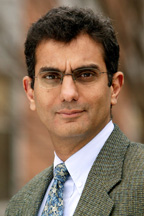Title: SAT-Based Post-Silicon Fault Localization
Speaker: Sharad Malik, Lothrop Professor and Chair, Princeton Electrical Engineering
Abstract: The problem of locating faults in failing silicon prototypes is referred to as silicon debug or post-silicon fault localization. This is particularly challenging for several reasons: the failing traces are often very long, spanning possibly billions of cycles; the chip has low observability, limited to the output pins and partial logging mechanisms such as trace buffers and scan chains; and electrical faults may be triggered only under very specific conditions. Traditional silicon debug solutions require deep human insight into the circuit function and are typically very costly and time consuming. In this talk I will discuss our recent work in automating this using Boolean Satisfiability (SAT)-based techniques. Over the past decade SAT solvers have emerged as a very powerful decision procedure with multiple applications in design verification. However, by themselves, these solvers do not scale to the size of silicon debug problems that occur in practice and thus cannot be applied directly. In this talk, I will discuss analysis techniques that build additional machinery around SAT solvers to enable scaling, as well as their application in practice.
Speaker Bio: Sharad Malik received the B. Tech. degree in Electrical Engineering from the Indian Institute of Technology, New Delhi in 1985 and the M.S. and Ph.D. degrees in Computer Science from the University of California, Berkeley in 1987 and 1990 respectively. Currently he is the George Van Ness Lothrop Professor of Engineering at Princeton University and the Chair of the Department of Electrical Engineering.
His research focuses on design methodology and design automation for computing systems. His research in functional timing analysis and propositional satisfiability has been widely used in industrial electronic design automation tools.
He has received the DAC Award for the most cited paper in the 50-year history of the conference (2013), the CAV Award for fundamental contributions to the development of high-performance Boolean satisfiability solvers (2009), the ICCAD Ten Year Retrospective Most Influential Paper Award (2011), the Princeton University President’s Award for Distinguished Teaching (2009), as well as several other best paper and teaching awards.
